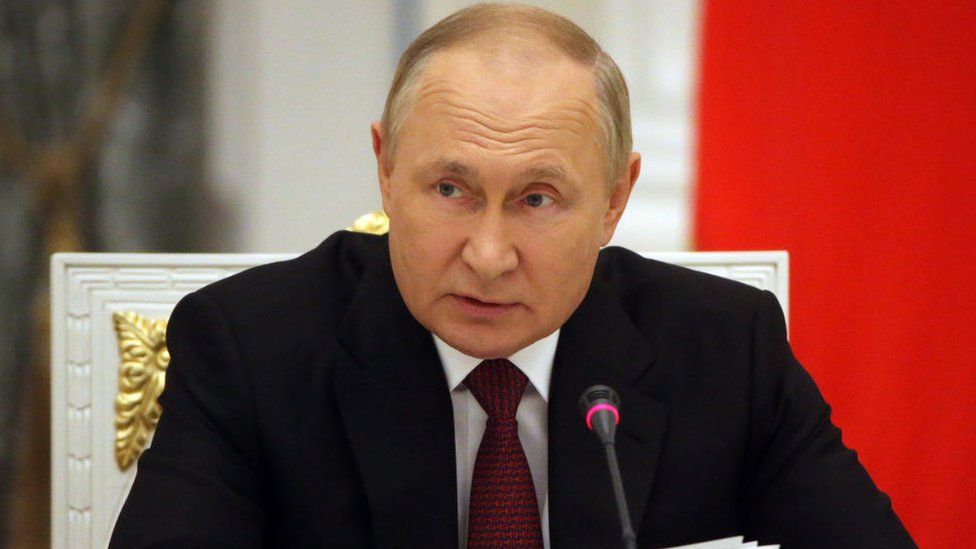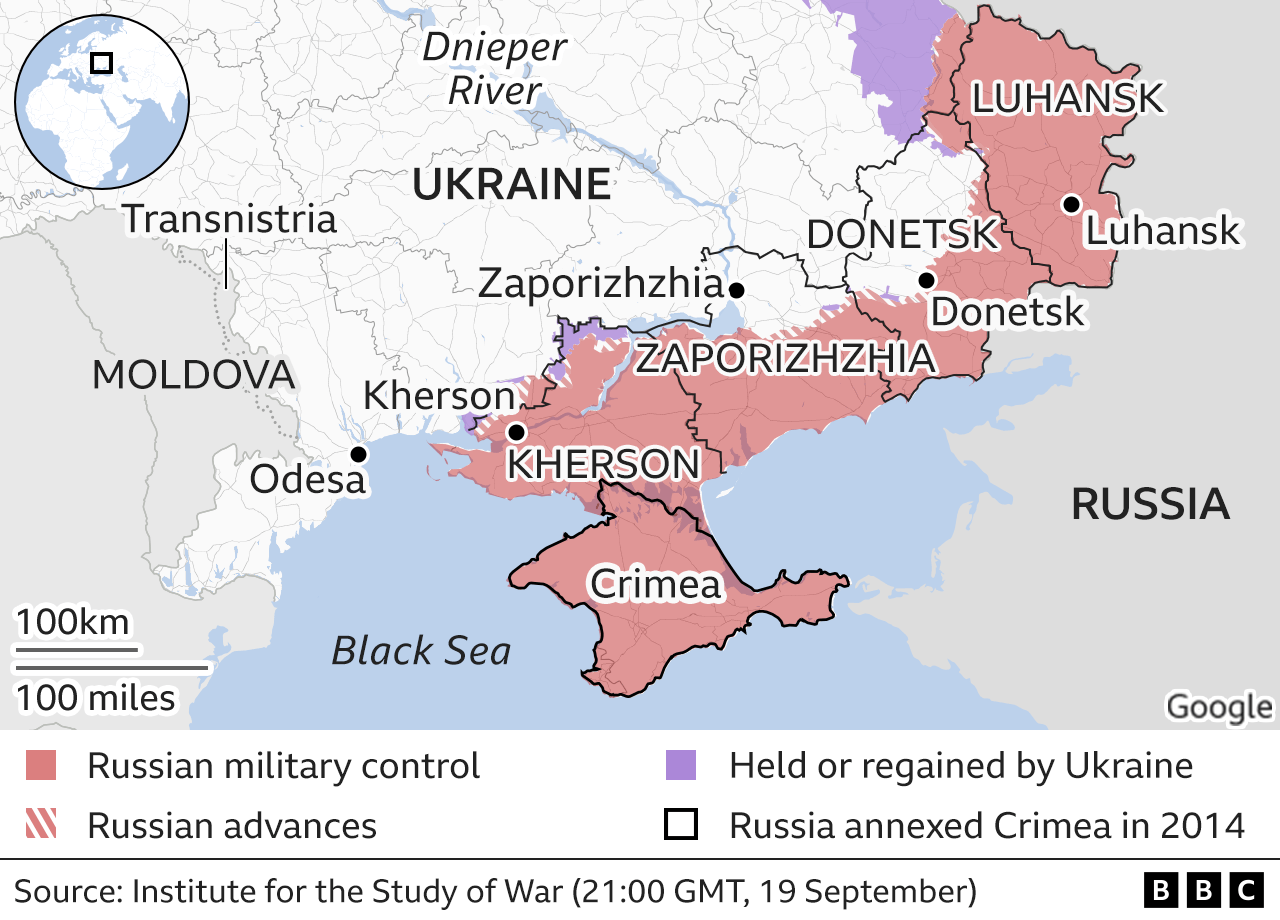
Russian-backed officials in four occupied regions of Ukraine have declared self-styled referendums on joining Russia.
There are echoes of Russia's annexation of Crimea, but this is different, as all four regions are at war and Russia seized Crimea without a gun being fired.
What is going on and why now?
After almost seven months of war, Russia's Vladimir Putin is on the back foot. Ukraine's counter-offensive has recaptured swathes of territory seized in the months after Russia's 24 February invasion.
He is under pressure from hardliners to respond, and backing Crimea-style referendums provides his critics with an answer. Russian media are already releasing opinion polls claiming widespread support for joining Russia, but they are as spurious as the votes being held in the middle of a war, with no proper scrutiny or legitimacy.
Just as his 2014 vote in Crimea was rejected as a sham by the international community, so are these, condemned already by the leaders of France and Germany.
But President Putin may feel that declaring occupied areas as Russian territory could change the course of the war, as it will enable him to tell Ukraine's Western backers to stop supplying arms. American Himars missile launchers in particular have hit Russian forces hard.
Russia analyst Alexander Baunov says Russia's hope is that the West will baulk at the thought of fighting in what Russia considers its territory.
What makes these votes a sham?
For five days, from 23-27 September, four regions of Ukraine that are partially or almost completely occupied by Russia will hold self-styled referendums, with voting either in person or remotely.
The vote is on joining the Russian Federation and the Russian-installed head of Kherson region in the south, Vladimir Saldo said incorporating it into Russia would "secure our territory and restore historical justice".
The regional capital, Kherson city, is not a safe place right now, with Russian soldiers struggling to hold back a big Ukrainian counter-offensive. The central administration building was hit by a series of missiles only last week. A secure vote is impossible.
Then there's Zaporizhzhia's capital, which remains securely in Ukrainian hands, so any vote to annex that region makes little sense.

Donetsk in the east is only 60% under Russian occupation and very much at the heart of the conflict, while Russia does control most of Luhansk in the north-east even if it has begun to lose ground.
Much of the pre-war population has fled the war. The head of Russia's proxy authority in Donetsk, Denis Pushilin, ordered a mass evacuation days before the invasion.
Russia's proxy leaders may have been keen to stage votes for several months, but this snap decision just three days in advance smacks of desperation.
In the words of France's Emmanuel Macron: "Russia started the war, invaded this region, bombed people, made people flee and now they are saying in this very region it's going to organise a referendum."
"We are seeing that local populations are all in favour of returning to Ukraine, and this is why there's so much guerrilla movement resistance in these territories, so these referendums are doomed," Ukrainian defence ministry adviser Yuriy Sak told the BBC.
What happens after annexation?
It is all so different from 2014. The Donetsk proxy leader has called on Mr Putin to respond to a positive decision after 27 September - "which we have no doubt about" - to consider it becoming part of Russia.
The Russian president most likely will decide to annex all four regions, but little will change on the ground as Ukraine's counter-offensive will continue.
Russia may well demand that Nato countries stop arming Ukraine but none of them will recognise the votes. As the Institute for the Study of War points out, Ukraine has already hit Russian military targets in Crimea, and there was no Russian retaliation.
Will Russia mobilise?
Until now, Russia's president has stopped short of declaring war, labelling this campaign a "special military operation". That has prevented full mobilisation and there is some talk that he may be on the verge of taking that step.
While the four regions were announcing their pseudo-votes, Russia's lower house of parliament was rushing through a change to the law introducing the concepts of "mobilisation" and "time of war" to the criminal code - with stiff penalties for desertion, surrender or going absent without leave (AWOL).
Mobilisation may now be on the table, but not immediately.
Mr Putin is signalling to his remaining allies that he is trying to end the war. Turkey's president said he even told him he was trying to do so as soon as possible.
However, if that doesn't work, Alexander Baunov believes he would then be able to blame others and turn his invasion of Ukraine into a defensive war. Moscow would then hope to legitimise the conflict for ordinary Russians and take further measures.
Is there a nuclear risk?
Russian propagandists regularly threaten the use of the country's nuclear arsenal, particularly now that their armed forces are losing on the battlefield in Ukraine. They have also painted the Ukraine campaign as a proxy war with Nato, even though Western leaders have been ultra-careful to avoid direct conflict.
The deputy head of Russia's security council, Dmitry Medvedev, issued a thinly veiled threat on Tuesday when he said that after annexation any encroachment on Russian territory could be met by "all the forces of self-defence".
Russian TV propagandist Margarita Simonyan went further, saying that strikes on Russian territory would become a "full-fledged war between Ukraine and Nato and Russia, untying Russia's hands".
UK Conservative MP Bob Seely, who has just visited Kyiv, believes the nuclear threat is largely a threat to intimidate and scare the West to halt Ukraine's supply of weapons.
But he warns of the danger that it could become self-fulfilling, so that Russia justifies the use of tactical nuclear weapons "to such an extent to themselves that it becomes eventually a rational response, however much we don't think it is a rational response".
https://news.google.com/__i/rss/rd/articles/CBMiMGh0dHBzOi8vd3d3LmJiYy5jby51ay9uZXdzL3dvcmxkLWV1cm9wZS02Mjk3MzQxNdIBNGh0dHBzOi8vd3d3LmJiYy5jby51ay9uZXdzL3dvcmxkLWV1cm9wZS02Mjk3MzQxNS5hbXA?oc=5
2022-09-20 21:30:52Z
1574218901
Tidak ada komentar:
Posting Komentar